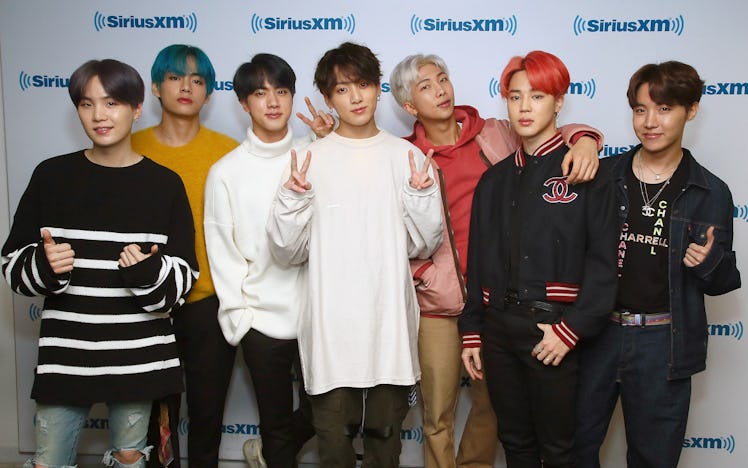
The Author Of 'Jung's Map Of The Soul' Just Reviewed BTS' New Album, Because He's A Fan
Trust me when I say BTS's latest comeback album is deep AF. A doctor told me so. Dr. Murray Stein's Jungian analysis of BTS' Map of the Soul: Persona proves the boys really went out of their way to get all the symbolism and innuendo right on their latest album, which is just one of the many things ARMYs love about them. This particular comeback album focuses on a long-standing psychoanalytical theory created by Swiss psychiatrist, Carl Jung, theorizing we all have different archetypes that make up our personality as a whole and our persona is just one of them. Dr. Murray Stein is an expert in Jungian theory who actually wrote a book on Jung's studies called Jung's Map of the Soul: An Introduction that the boys' album took inspiration from. It's safe to assume his breakdown and analysis of Map of the Soul: Persona carries a lot of weight.
Dr. Stein was recently featured on a podcast titled Speaking of Jung where he got candid about BTS and their interpretation of Jung's themes in their work. Specifically, Stein focuses on the lyrics on the new album and how they relate back to Jung. He admits he is not a music expert (though, he has like a zillion degrees, so we'll give him a pass on the whole "not a music expert" thing). He also noted that he was working with lyrical translations, which meant original nuances and meanings might be literally lost in translation. Still, Stein found a ton of purpose in BTS' words.
To begin, Stein hopes this album is the first in a series of albums to come, each exploring a different piece of the human psyche (and if the boys' Love Yourself series is anything to go by, he's onto something). Stein believes it's possible the boys chose "persona" as their first album because it is one of the easiest facets of Jung's archetypes to understand. Essentially, the persona refers to the "masks" people wear throughout their lives, meaning any one individual acts and behaves one way at work, one way at home, so on and so forth.
Stein stated, "The way I understand the BTS group, having looked at their videos, is that these seven young men represent different aspects of a single personality. That's the way I'm going to think of it... We're talking about a single person with different faces." (Just to be clear, when Stein says the boys represent seven facets of one personality, he's referring to their musical persona — and it's just for analytical means— not that they're one person IRL, btw.)
OK. Everyone still with me (him)?
From there, Stein broke down the themes in each of the seven songs on the album, noting there are through-lines of "longing" and "struggle for authenticity." He adds the themes run the gamete of human emotion and thought, including love, hope, vision, and despair.
"It's poignant," Stein shared. "I feel for this 'personality' struggling with issues that have arisen in his life by virtue of his great talent and his now fame but doesn't satisfy all of his needs."
Well, this is deep. My brain is sore already. Shall we continue?
Stein touches on how RM's lyrics in "Persona" and how he seems to be struggling with hiding his immaturity and anxiety and worries about being "enough" for his fans. This comes through in the lyrics, "Someone like me ain’t good enough for the truth / Someone like me ain’t good enough for a calling / Someone like me ain't good enough to be a muse."
According to Stein, the first song is a question, essentially asking "where is your soul," and the question is answered with the second song, "Boy With Luv." If we're following Stein's train of thought, he believes singer Halsey represents the soul or anima figure (according to Jungian theory, the "anima" is the unconscious feminine side of a man, while the "animus" is the unconscious masculine side of a woman).
Anyway, no pressure, Halsey.
From there, Stein continues to walk through the album identifying the different experiences and emotions the "one personality" (made up of the seven different boys) seems to be going through in each song. He believes the album is a journey, or even, like, an evolution.
You guys get it. It's a whole thing, OK?
To hear more on Stein's expert take, you can pop over to Speaking of Jung's website and check out episode 44. I'd be remiss not to recommend you also listen to Map of the Soul: Persona on Spotify and do your own deep dive into the meaning on top of listening to Stein's expert analysis. Stein's thoughts are definitely helpful in understanding the deeper meaning of MotS: Persona, but the actual album is a little more energetic... and you can dance to it. (No offense, Stein.)